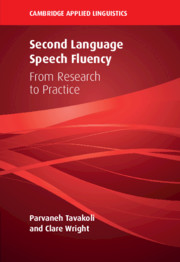Book contents
- Second Language Speech Fluency
- The Cambridge Applied Linguistics Series
- Second Language Speech Fluency
- Copyright page
- Dedication
- Contents
- Figures
- Tables
- 1 Introduction
- 2 Fluency from a Psycholinguistic Perspective
- 3 Measuring Fluency
- 4 Fluency in Second Language Task-Based Research
- 5 Fluency in Second Language Pedagogy
- 6 Fluency in Second Language Testing
- 7 Fluency in Different Contexts
- 8 Conclusion
- Appendix: Fluency Descriptors across Time
- References
- Author Index
- Subject Index
6 - Fluency in Second Language Testing
Published online by Cambridge University Press: 15 December 2020
- Second Language Speech Fluency
- The Cambridge Applied Linguistics Series
- Second Language Speech Fluency
- Copyright page
- Dedication
- Contents
- Figures
- Tables
- 1 Introduction
- 2 Fluency from a Psycholinguistic Perspective
- 3 Measuring Fluency
- 4 Fluency in Second Language Task-Based Research
- 5 Fluency in Second Language Pedagogy
- 6 Fluency in Second Language Testing
- 7 Fluency in Different Contexts
- 8 Conclusion
- Appendix: Fluency Descriptors across Time
- References
- Author Index
- Subject Index
Summary
Research examining how language testing organizations measure fluency, design their fluency rating scales and develop their fluency descriptors is limited; the complexities involved in human rating of fluency make it difficult to assess fluency in any kind of multidimensional way. This chapter highlights the importance of assessing fluency objectively, accurately and consistently, in order to increase validity; also, we argue that developing a research-evidenced approach to assessing fluency in L2 tests of speaking is needed, particularly in taking a more dynamic, task-based approach into consideration. After examining the existing fluency descriptors and rating scales in some international tests of speaking, the chapter reports recent research investigating fluency across different levels of proficiency. It will also discuss in what ways a broader theoretical perspective to assessment of fluency, e.g. using conversation analysis techniques, should be considered when validating assessment of fluency. Effects of raters, rating scales and rating descriptors on judgements of fluency will also be discussed, and merits and limitations of automated assessment of fluency will be evaluated, relating the implications of important developments for practice in language testing and for future research.
Keywords
Information
- Type
- Chapter
- Information
- Second Language Speech FluencyFrom Research to Practice, pp. 103 - 123Publisher: Cambridge University PressPrint publication year: 2020
